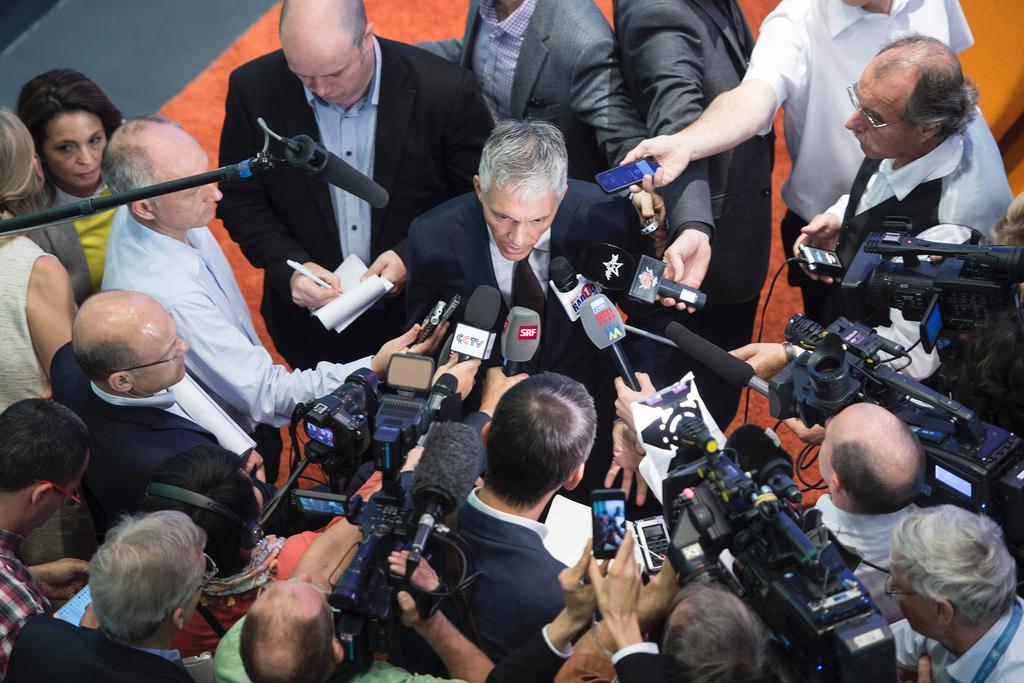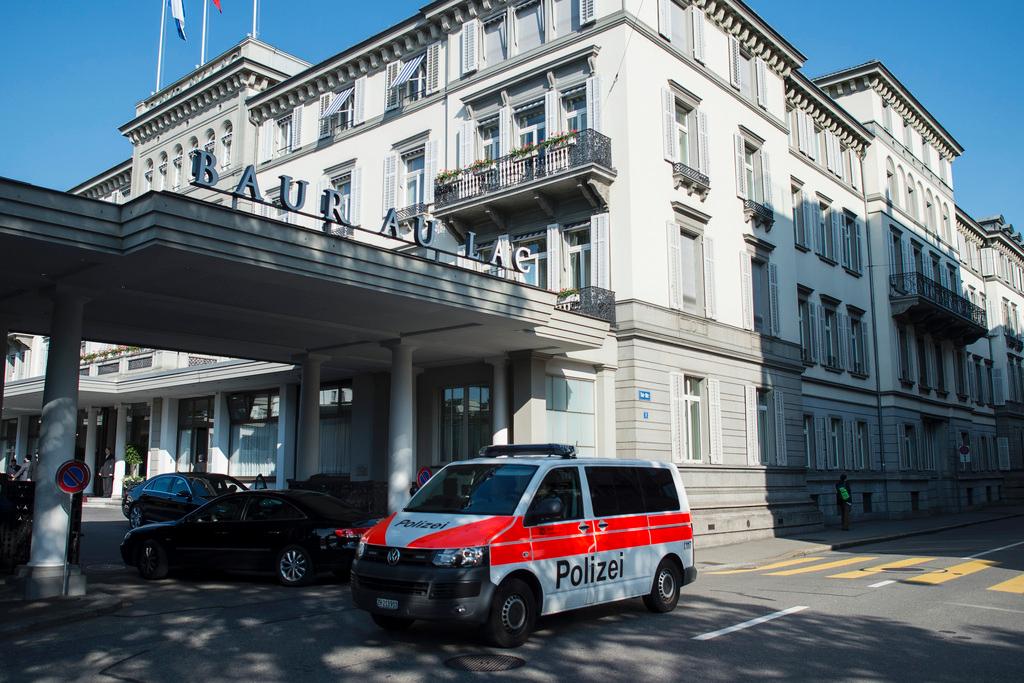Swiss prosecutor analysing suspicious FIFA banking activity

As part of its FIFA investigation, the Swiss Federal Prosecutor’s Office is looking into 53 suspicious activity reports filed by Swiss banks.
At a media conference in Bern on Wednesday, Swiss Federal Prosecutor Michael Lauber gave an update of the ongoing criminal proceedings in connection with the 2018 and 2022 FIFA World Cups – controversially awarded to Russia and Qatar respectively.
The evidence collected amounts to nine terabytes of data. By comparison, the US Library of Congress has published estimates on its website that its entire collection of printed works amounts to ten terabytes.
“So far our investigative team obtained evidence concerning 104 banking relations (relationships between banks and clients). And be aware that every banking relation represents several bank accounts,” Lauber said in his first public comments since his office seized FIFA computer data last month.
He said transactions investigators were looking at included 53 which had been flagged in suspicious activity reports by Switzerland’s Financial Intelligence Unit, an anti-money laundering agency.
While some of the evidence was collected in response to a US mutual legal assistance request, Switzerland has not asked the US for assistance yet.
So far ten people have been questioned, and Lauber said he would not rule out interviews with FIFA President Sepp Blatter or Secretary General Jérôme Valcke.
Task force
In addition, a task force has been established. Lauber said the head of the prosecutor’s office’s white-collar crime division was leading this task force, which includes “specialised and experienced prosecutors, experts in mutual legal assistance and a specialised forensic IT team from the Federal Criminal Police”.
He said the task force would be focused or extended, depending on the tactical needs of the investigation.
“The world of football must be patient. It will take more than the legendary 90 minutes. It could be months or years,” Lauber said.
Asked whether the Swiss investigation could derail Russia’s plans to host the 2018 World Cup, Lauber said that decision was not his problem.
“I don’t care about FIFA’s timetable, I only care about my own, which I can’t disclose.”
Awaiting extradition
The statement came three weeks after the world’s attention focused on a luxury hotel in Zurich, where Swiss police arrested, at the request of US authorities, several high-ranking FIFA officials who had gathered for the organisation’s annual meeting.
Swiss authorities said they opened criminal proceedings on March 10 into FIFA, world football’s governing body, based on suspicion of “irregularities” and illegal profiteering, partly in Switzerland, related to the votes won by Russia and Qatar.
Julius Baer
Swiss bank Julius Baer said on Wednesday it had opened an internal investigation in connection with FIFA amid a corruption scandal surrounding football’s governing body.
Julius Baer, Switzerland third-largest listed bank, was one of a number of banks mentioned in the US Department of Justice’s May charge sheet against high-ranking individuals in FIFA.
“We have launched an internal investigation,” a spokesman for Zurich-based Julius Baer said. “We are fully cooperating with the authorities.”
The spokesman declined to say when the investigation began or with which authorities it was cooperating.
They said the proceedings were against “persons unknown on suspicion of criminal mismanagement and of money laundering”.
The detainees are currently awaiting extradition to the United States, which could take months, even a year. Since the FIFA officials have not agreed to be extradited, the US authorities have to officially request their extradition.
On May 27, the prosecutor’s office also seized electronic data and documents from FIFA’s headquarters to be used in the Swiss and US investigations. Before those seizures, it had requested bank information based on a suspicion of money laundering through banks in Switzerland.
US proceedings
In separate proceedings, the US Attorney’s Office for the Eastern District of New York is conducting a criminal investigation into the allocation of media, marketing and sponsoring rights for football tournaments carried out in the United States and Latin America. The Swiss Federal JusticeOffice is supporting this criminal investigation as part of international legal assistance.
On Wednesday, Lauber stressed that his work was completely independent of ongoing investigations in the United States. While Switzerland had received and fulfilled a request for legal assistance from the United States, Switzerland had not asked for any such help in return, he added.
As host to 65 international sports federations including FIFA and the top international court for resolving sports disputes, Switzerland serves as the epicentre of the global sports business and arbitration that goes along with it. As such, it has been under pressure to enforce more transparency.
FIFA scandal: latest twists and turns
May 27, 2015: US justice officials announce a lengthy investigation into FIFA that has uncovered decades of bribery totalling more than $150 million. Federal racketeering charges are unveiled against 14 people, including nine current and former FIFA executives; seven are arrested at Hotel Baur au Lac in Zurich where they had been preparing for a FIFA congress. Officials are charged with buying and selling votes to deliver the 2010 World Cup to South Africa and soliciting kickbacks from sports marketers. Swiss authorities seize documents from FIFA offices as part of a separate criminal investigation into the 2018 and 2022 World Cup bids.
May 29: FIFA’s 79-year-old Swiss president Sepp Blatter is re-elected to a fifth four-year term.
June 1: The New York Times reports federal authorities believe Blatter’s top lieutenant Jérôme Valcke, FIFA’s secretary general, was behind the $10 million in bank transactions that are at the centre of FIFA’s corruption scandal. Valcke denies this. A week later, he admits in did in fact authorise the transaction.
June 2: Blatter announces he will resign and calls for new elections to choose his successor.
June 3: US justice officials release transcript of 2013 hearing with former FIFA executive committee member (1997-2013) and US citizen, Charles “Chuck” Blazer, which showed that Blazer and others in FIFA agreed to accept bribes in bidding for the 1998 and 2010 World Cups and other tournaments. According to US officials, Blazer’s cooperation helped build the sprawling corruption case against FIFA figures.
June 11: Walter De Gregorio, FIFA’s Swiss-Italian head of communications, resigns days after making a joke on Swiss television about FIFA.

In compliance with the JTI standards
More: SWI swissinfo.ch certified by the Journalism Trust Initiative










You can find an overview of ongoing debates with our journalists here . Please join us!
If you want to start a conversation about a topic raised in this article or want to report factual errors, email us at english@swissinfo.ch.